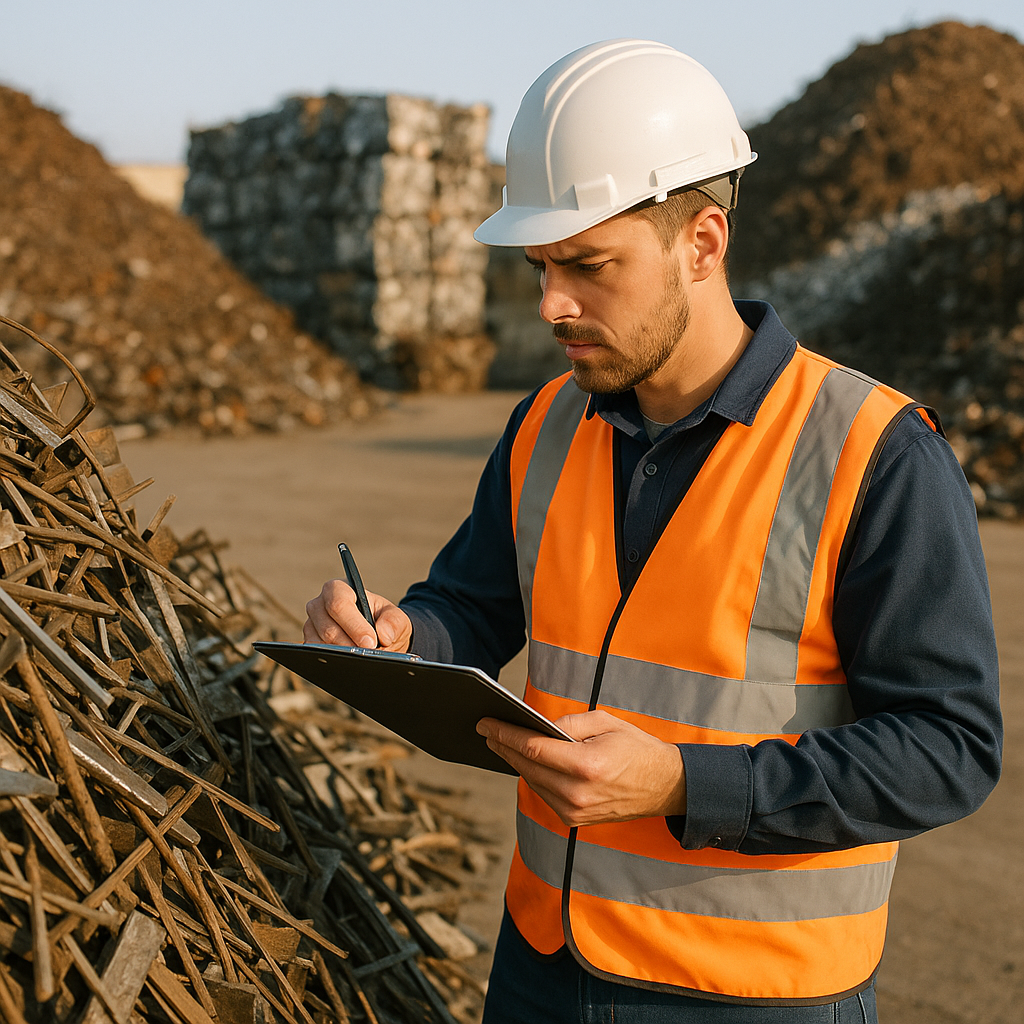5901 Botham Jean Blvd, Dallas, TX 75215
Discover the Compliance Process for Recycling Standards
October 15, 2025In the recycling industry, adhering to established standards is not optional—it’s essential. The compliance process for recycling standards requires organizations to follow specific guidelines that dictate how materials are collected, sorted, processed, and traded in the marketplace.
These standards serve as the industry’s common language. Without them, the global movement of recyclable materials would lack the consistency and quality assurance needed to support a circular economy. Specifications created by organizations like the Institute of Scrap Recycling Industries (ISRI) provide the framework that makes recycling both economically viable and environmentally beneficial.
ISRI, representing over 1,300 companies operating in more than 40 countries, has developed comprehensive specifications for various recyclable materials. These guidelines enable recyclers to maintain quality standards while facilitating domestic and international trade of materials, including ferrous and non-ferrous metals, paper, plastics, electronics, glass, and rubber.
How Do ISRI Specifications Work?

ISRI Specifications function as the universal language of recycled commodities trading. They establish standardized definitions and quality parameters that both buyers and sellers can reference in transactions. This standardization eliminates confusion and sets clear expectations for material quality across global recycling markets.
The specifications cover a wide range of recyclable materials, making them essential for nearly all transactions in the recycling industry. Each material category has detailed guidelines on acceptable composition, prohibited items, and tolerance levels for various contaminants.
Material Categories Under ISRI Specifications
ISRI Specifications address an extensive range of recyclable materials to meet the diverse needs of the recycling industry. For ferrous metals, they define different grades of steel and iron scrap. Nonferrous specifications cover materials like aluminum, copper, lead, nickel, and zinc, with precise definitions for each grade.
Paper stock specifications detail different grades of recovered paper and fiber products. The plastics category includes specifications for various polymer types, with recent updates for polypropylene and mixed rigid plastics reflecting current market practices. Glass cullet specifications define parameters for different colors and qualities of recycled glass.
Electronics specifications address the proper handling and processing of e-scrap. Tire specifications provide guidelines for processing and trading recycled rubber materials. Residential recycling programs benefit from specifications for both single and dual-stream collection systems.
The Dynamic Nature of ISRI Specifications
A key feature of ISRI Specifications is their adaptability. The recycling industry evolves constantly with new materials entering the waste stream and advances in processing technologies. ISRI maintains an ongoing review process to keep specifications relevant.
Individuals, companies, or organizations can propose changes to the specifications. This democratic approach ensures the standards reflect current market realities. When new packaging materials appear or sorting technology improves, ISRI can update specifications accordingly.
A recent example demonstrates this adaptability. In December 2023, ISRI released updated recycled plastics specifications. These updates resulted from collaboration between ISRI and the Association of Plastic Recyclers, reflecting technological innovations such as optical sorters and robotics that have enhanced plastics processing capabilities.
Global Application and Benefits
ISRI Specifications are internationally recognized and facilitate global trade in recycled materials. They serve as the foundation for contracts between domestic and international buyers and sellers, helping to develop markets for recycled materials worldwide.
By providing clear quality parameters, the specifications help maintain consistent material quality and reduce disputes between trading partners. For recycling facilities and processors, adhering to these specifications ensures their materials meet market expectations.
While ISRI Specifications offer standardized guidelines, they also allow flexibility. Trading partners can modify specifications for specific transactions when needed, provided any deviations are mutually agreed upon and documented to maintain clarity in business relationships.
The U.S. Department of Commerce recognizes the importance of these specifications in promoting exports of recycled materials. Their Market Development Cooperator Program has provided funding to promote ISRI Specifications globally, further establishing them as the global standard for recycled commodity trading.
What Are the Key Components of Recycling Compliance?

Recycling compliance involves several essential elements that ensure materials are processed according to established standards and regulations. At its core, compliance requires adherence to material quality standards, proper trading procedures, and environmental requirements that safeguard business interests and ecological systems.
Material quality standards form the foundation of recycling compliance. These standards specify the acceptable levels of contamination, required sorting procedures, and physical properties that recyclable materials must meet. For example, steel recycling requires specific purity thresholds and physical specifications to ensure the recycled metal can be effectively reprocessed for future use.
Trading procedures are another crucial compliance component. These procedures govern how materials change hands throughout the recycling chain. Legitimate recycling must produce valuable products or intermediates that are either sold to third parties or used effectively as substitutes for commercial products. The EPA distinguishes genuine recycling from “sham recycling” through criteria that assess whether materials contribute usefully to the recycling process.
Environmental and sustainability requirements form the third pillar of recycling compliance. These include regulations established under the Resource Conservation and Recovery Act (RCRA), which governs the management of hazardous secondary materials throughout their lifecycle. Facilities handling these materials must implement proper containment systems, maintain emergency preparedness protocols, and keep detailed documentation of their recycling activities.
In steel recycling, compliance extends to meeting green building standards and obtaining certifications like LEED (Leadership in Energy and Environmental Design). Steel recycled for construction projects must comply with LEED criteria related to material content, production methods, and sustainability impacts. This includes documentation of recycled content percentages and verification that materials were handled according to environmental guidelines.
Design for Deconstruction (DfD) principles are another important aspect of recycling compliance, particularly in construction and demolition contexts. These principles ensure buildings are designed with eventual disassembly and material recovery in mind. Implementing DfD approaches facilitates higher quality material recovery and supports LEED certification goals by increasing diversion rates from landfills.
Compliance monitoring serves as the enforcement mechanism for these standards. Regulatory agencies conduct inspections to verify adherence through reviews of facility records, visual assessments of storage areas, evaluation of containment systems, and verification of employee training. Non-compliance can result in significant penalties, corrective action orders, or facility permit revocations.
Quality benchmarks provide measurable targets for recycling operations. These benchmarks establish minimum thresholds for material purity, processing efficiency, and environmental performance. For instance, under LEED certification requirements, construction waste management plans must establish goals identifying target materials and specify whether they will be separated or commingled during the recycling process.
The benefits of robust compliance extend beyond regulatory adherence. Businesses with strong compliance programs often achieve improved operational efficiency, enhanced market access, and better stakeholder relationships. Environmentally, benefits include reduced landfill use, lower greenhouse gas emissions, and conservation of virgin resources.
How Are Recycling Standards Enforced?
The Institute of Scrap Recycling Industries (ISRI) plays a key role in self-regulation by offering an Arbitration Service to help members resolve disputes related to material specifications without resorting to lengthy legal proceedings. This system efficiently resolves conflicts when recycled materials don’t meet agreed-upon standards.
Third-party certifications are crucial for enforcing recycling standards externally. These certifications verify compliance with established standards through independent assessment. For example, the Association of Plastic Recyclers (APR) offers a PCR Certification program, which provides third-party verification that recycled content originates from post-consumer sources. This program follows a full chain of custody approach, requiring documentation from collection through processing.
The certification process typically involves selecting an approved certification body, gathering data on material sources and flows, completing on-site audits, and receiving formal certification upon successful completion. These certifications help brands meet voluntary commitments and regulatory requirements in states with recycled content mandates like California, Washington, and New Jersey.
Specialized standards provide enforcement for specific industries. LEED certification for construction projects rewards the use of recycled materials, while the Responsible Steel International Standard ensures ethical sourcing and processing in steel production. These frameworks enhance accountability.
Compliance demands substantial documentation and regular verification. Organizations must maintain detailed records of material inputs, processing methods, and final compositions. Regular audits assess adherence to protocols covering aspects from material composition to environmental impact. For example, under the Ocean Bound Plastic certification, organizations must demonstrate traceability throughout the recycling process and prove they meet requirements prohibiting child labor and ensuring fair payments to waste collectors.
The enforcement landscape is evolving as governments implement more recycled content requirements. California’s recycling legislation, for instance, mandates that producers of certain single-use packaging include at least 30% recycled material by 2028, increasing to 65% by 2032. Certification programs help validate claims to ensure compliance with these mandates.
This combination of industry-led self-regulation and independent third-party verification creates a framework that upholds standards while accommodating the practicalities of recycling. The system balances flexibility with accountability, allowing the recycling industry to maintain credibility and continue innovating.
Conclusion: The Importance of Compliance in Recycling

Compliance with recycling standards is essential for maintaining the quality and sustainability of recycled materials. When businesses adhere to industry specifications, they create a more efficient recycling ecosystem that delivers both environmental and economic benefits. Material quality remains consistent, facilitating smoother trading relationships and ensuring that recycled materials can effectively replace virgin resources in manufacturing processes.
The regulatory landscape of recycling continues to evolve as new technologies emerge and sustainability goals become more ambitious. Businesses that stay informed about these changes position themselves advantageously in an increasingly environmentally conscious marketplace. Regulatory compliance is not just about avoiding penalties but represents a commitment to environmental stewardship and resource conservation that benefits everyone.
For organizations seeking expert guidance in recycling compliance, contact Okon Recycling at 214-717-4083. Our team can help you implement compliant recycling practices that maximize both environmental and economic benefits while ensuring your operations meet all current standards.
